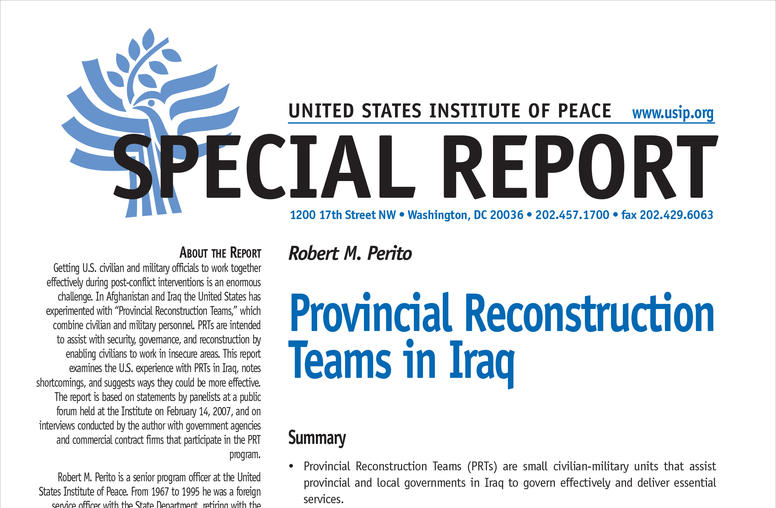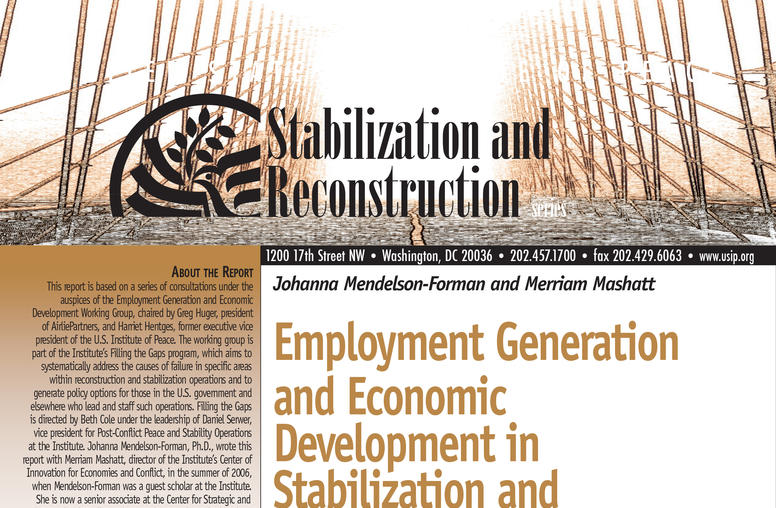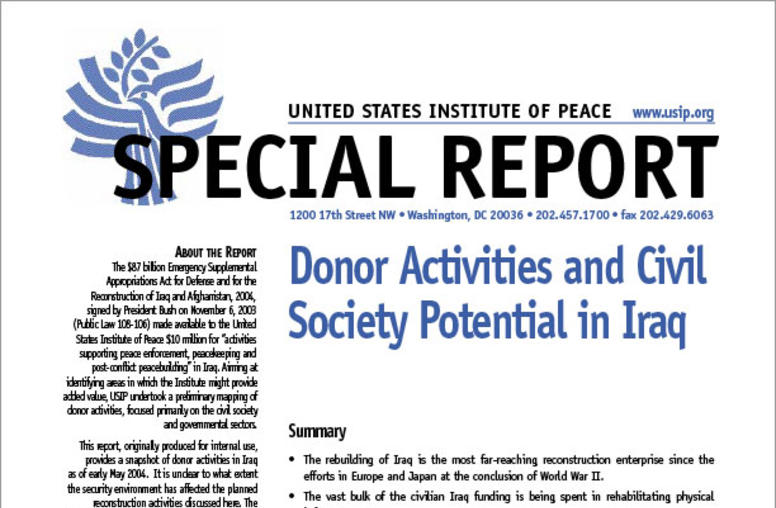Question And Answer
Publications
Articles, publications, books, tools and multimedia features from the U.S. Institute of Peace provide the latest news, analysis, research findings, practitioner guides and reports, all related to the conflict zones and issues that are at the center of the Institute’s work to prevent and reduce violent conflict.

Provincial Reconstruction Teams in Iraq
In January 2007, President Bush announced that the United States would double the number of Provincial Reconstruction Teams (PRTs), small civilian-military units that assist provincial and local governments to govern effectively and deliver essential services, as part of his plan for a "New Way Forward" in Iraq. This report examines the U.S. experience with PRTs in Iraq, notes shortcomings, and suggests ways they could be more effective.

Employment Generation and Economic Development in Stabilization and Reconstruction Operations
It seems logical that improving the lives of those who have suffered from conflict would include a program to generate economic well-being in the immediate period after hostilities subside. Yet livelihood creation, the root of potential economic success and security, has often become a secondary objective in the transformation from war to peace.

Oil, Profits, and Peace
An evenhanded and insightful picture of the obstacles, fiscal incentives, and growing potential for Western oil companies to ameliorate or even prevent conflict in the areas where they operate.
Oral Histories: The Sudan Experience Project
The Sudan Experience Project Oral History Library contains the transcripts of nearly 100 interviews with those who negotiated and who are implementing the CPA. These first person accounts and the lessons learned from their experience are a substantial contribution to our understanding of the challenges of negotiating and implementing complex peace agreements.
Central African Republic, Chad, and Sudan: Triangle of Instability?
United Nations Under Secretary for Humanitarian Affairs Jan Egeland warned last month that the crises in Darfur, Chad, and Central African Republic (CAR) are intimately linked and could lead to a dangerous regional crisis. What are the factors behind the rebellions within CAR and Chad, and what is their relationship to the Darfur conflict?
Can the Diaspora Solve Haiti's Enduring Social Conflict?
How can the Haitian diaspora help Haiti's new government? Can they help resolve the chronic social conflict that has troubled the Haitian republic since its inception?
Haiti's Economic Challenge
Haiti's new government faces an enormous economic challenge. Since a brief spike in the 1970's, Haiti's economy has experienced a steady decline as a result of rapacious government policies and, possibly well intentioned, but destructive international sanctions.
Emergent Insecurity in Eastern Sudan
A USIPeace Briefing recapping a meeting of the Institute's Sudan Peace Forum on the Beja people and the recent escalation of violence in Eastern Sudan.

Donor Activities and Civil Society Potential in Iraq
The $87 billion Emergency Supplemental Appropriations Act for Defense and for the Reconstruction of Iraq and Afghanistan, 2004, signed by President Bush on November 6, 2003 (Public Law 108-106) made available to the United States Institute of Peace $10 million for “activities supporting peace enforcement, peacekeeping and post-conflict peacebuilding” in Iraq. Aiming at identifying areas in which the Institute might provide added value, the Institute undertook a preliminary mapping of donor ac...
The Palestinian Reform Agenda
The Oslo Accords reached by the Palestine Liberation Organization (PLO) and Israel in 1993-95 ushered into existence the Palestinian Authority and inspired efforts to build autonomous structures for Palestinian self-rule. Since the earliest days of the Palestinian Authority, a varied group of Palestinians has sought to lay the practical foundation for Palestinian statehood through the construction of strong institutions with clear (and generally liberal) legal bases.